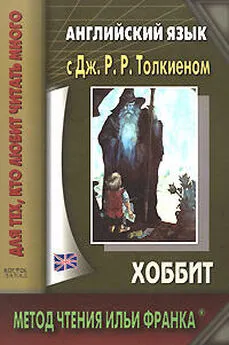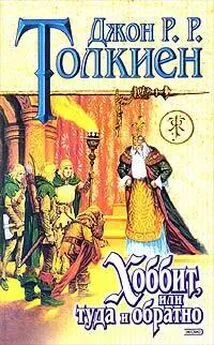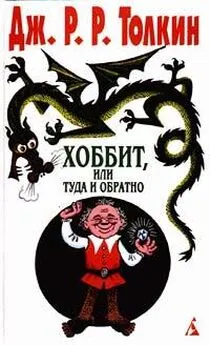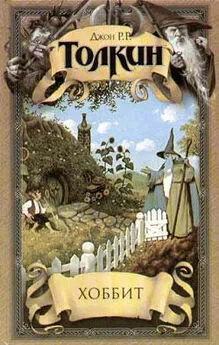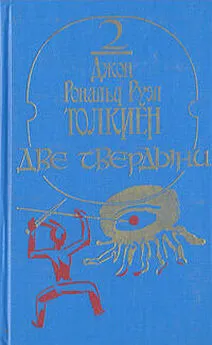Джон Толкиен - Английский язык с Дж. Р. Р. Толкиеном. Хоббит
- Название:Английский язык с Дж. Р. Р. Толкиеном. Хоббит
- Автор:
- Жанр:
- Издательство:АСТ, Восток-Запад
- Год:2008
- Город:Москва
- ISBN:978-5-17-048593-2, 978-5-478-00597-9
- Рейтинг:
- Избранное:Добавить в избранное
-
Отзывы:
-
Ваша оценка:
Джон Толкиен - Английский язык с Дж. Р. Р. Толкиеном. Хоббит краткое содержание
В книге предлагается произведение на английском языке Джона Р. Р. Толкиена «Хоббит», адаптированное (без упрощения текста оригинала) по методу Ильи Франка. Уникальность метода заключается в том, что запоминание слов и выражений происходит за счет их повторяемости, без заучивания и необходимости использовать словарь.
Пособие способствует эффективному освоению языка, может служить дополнением к учебной программе.
Предназначено для студентов, для изучающих английский язык самостоятельно, а также для всех интересующихся английской культурой.
Пособие подготовила Ольга Ламонова.
Английский язык с Дж. Р. Р. Толкиеном. Хоббит - читать онлайн бесплатно полную версию (весь текст целиком)
Интервал:
Закладка:
“Good heavens (Боже мой: «добрые небеса»)! he has gone like Bombur (он свихнулся, как Бомбур), ” they said (сказали они). “Don’t tell us about dreams (не говорите нам о снах). Dream-dinners aren’t any good (от обедов во сне никакой пользы), and we can’t share them (и мы не можем их разделить; to share — делить, разделять, участвовать ). ”
“They are the best (они — это самое лучшее) I am likely to get (что я, скорее всего, получу) in this beastly place (в этом ужасном месте; beastly — скотский, свинский, противный ), ” he muttered (пробормотал он), as he lay down beside the dwarves (когда он прилег рядом с гномами) and tried to go back to sleep (и попытался вернуться ко сну) and find his dream again (и снова найти свой сон). But that was not the last of the lights in the forest (но это были не последние огни в лесу). Later when the night must have been getting old (позже, когда ночь уже близилась к концу: «должно быть, уже становилась старой»), Kili who was watching then (Кили, который тогда был в дозоре), came and roused them all again (подошел и поднял их всех снова; to rouse — вспугивать, будить, поднимать ), saying (говоря):
“There’s a regular blaze of light begun (зажглось: «началось» /море/ постоянных огней; to begin (began, begun) — начинать (ся), приступать ) not far away (невдалеке) — hundreds of torches (сотни факелов) and many fires (и множество костров) must have been lit suddenly (должно быть, были зажжены внезапно; to light (lit) — зажигать (ся), загорать (ся), освещать ) and by magic (и по волшебству). And hark to the singing and the harps (и прислушайтесь к пению и арфам; hark! — слушай!; чу! )!”
sheer [ʃɪǝ] gorgeous [ˈɡɔ: dʒǝs] beastly [ˈbi: stlɪ] harp [hɑ: p]
They were just giving up hope, when Dori stumbled across him by sheer luck. In the dark he fell over what he thought was a log, and he found it was the hobbit curled up fast asleep. It took a deal of shaking to wake him, and when he was awake he was not pleased at all.
“I was having such a lovely dream, ” he grumbled, “all about having a most gorgeous dinner. ”
“Good heavens! he has gone like Bombur, ” they said. “Don’t tell us about dreams. Dream-dinners aren’t any good, and we can’t share them. ”
“They are the best I am likely to get in this beastly place, ” he muttered, as he lay down beside the dwarves and tried to go back to sleep and find his dream again. But that was not the last of the lights in the forest. Later when the night must have been getting old, Kili who was watching then, came and roused them all again, saying:
“There’s a regular blaze of light begun not far away — hundreds of torches and many fires must have been lit suddenly and by magic. And hark to the singing and the harps!”
After lying and listening for a while (после того, как они лежали и слушали какое-то время), they found they could not resist the desire (они обнаружили, что они не могут противостоять желанию; to resist — сопротивляться ) to go nearer (подойти поближе) and try once more to get help (и попытаться еще раз получить помощь). Up they got again (они снова поднялись); and this time the result was disastrous (и на этот раз результат был бедственный; disaster — беда, бедствие, несчастье ). The feast that they now saw (пир, который они теперь увидели) was greater and more magnificent than before (был величественнее и великолепнее, чем раньше); and at the head of a long line of feasters (и во главе длинного ряда пирующих) sat a woodland king (сидел лесной царь) with a crown of leaves (с короной из листьев) upon his golden hair (на его золотистых волосах), very much as Bombur had described (очень похожий на описанную Бомбуром) the figure in his dream (фигуру из его сна). The elvish folk were passing bowls (народ эльфов передавал чаши; to pass — идти, проходить /мимо/, передавать ) from hand to hand (из рук в руки) and across the fires (и через костры), and some were harping (и некоторые играли на арфе) and many were singing (и многие пели). Their gloaming hair (их темные волосы; gloaming — /поэт. / сумерки ) was twined with flowers (были увиты цветами; to twine — вить; свивать, скручивать; плести, сплетать ); green and white gems glinted on their collars (зеленые и белые драгоценные камни сверкали на их воротниках) and their belts (и их поясах); and their faces (и их лица) and their songs (и их песни) were filled with mirth (были наполнены радостью). Loud and clear and fair were those songs (громкими, чистыми и простыми были эти песни), and out stepped Thorin into their midst (и в самую их середину вступил Торин; to step — шагать, ступать, to step out — вышагнуть, выступить ).
desire [dɪˈzaɪǝ] disastrous [dɪˈzɑ: strǝs] magnificent [mæɡˈnɪfɪs (ǝ) nt]
After lying and listening for a while, they found they could not resist the desire to go nearer and try once more to get help. Up they got again; and this time the result was disastrous. The feast that they now saw was greater and more magnificent than before; and at the head of a long line of feasters sat a woodland king with a crown of leaves upon his golden hair, very much as Bombur had described the figure in his dream. The elvish folk were passing bowls from hand to hand and across the fires, and some were harping and many were singing. Their gloaming hair was twined with flowers; green and white gems glinted on their collars and their belts; and their faces and their songs were filled with mirth. Loud and clear and fair were those songs, and out stepped Thorin into their midst.
Dead silence fell in the middle of a word (мертвая тишина наступила прямо посредине слова; to fall (fell, fallen) — падать, опускаться, наступать, охватывать ). Out went all light (все огни погасли). The fires leaped up in black smokes (костры заклубились черным дымом; to leap — прыгать, внезапно появляться ). Ashes and cinders were in the eyes of the dwarves (пепел и зола оказались в глазах гномов; ashes — зола, пепел, cinder — тлеющие угли, cinders — зола, пепел ), and the wood was filled again (и лес снова был наполнен) with their clamour and their cries (их криками и воплями; clamour — шум, крики, громкие требования ). Bilbo found himself running round and round (Бильбо внезапно для себя обнаружил, что бегает кругами: «вокруг и вокруг») (as he thought (как он думал)) and calling and calling (и крича и окликая):
“Dori, Nori, Ori, Oin, Gloin, Fili, Kili, Bombur, Bifur, Bofur, Dwalin, Balin, Thorin Oakenshield (Дори, Нори, Ори, Ойн, Глойн, Фили, Кили, Бомбур, Бифур, Бофур, Двалин, Балин, Торин Оукеншильд), ” while people he could not see or feel (в то время, как люди, которых он не мог видеть или чувствовать) were doing the same all round him (делали тоже самое со всех сторон вокруг него) (with an occasional “Bilbo!” thrown in (временами вставлялось: «/было/ брошено внутрь» и «Бильбо»; to throw (threw, thrown) — бросать, кидать, направлять; occasional — случающийся время от времени, иногда, редко; occasion — происшествие, случай, событие, явление ). But the cries of the others (но крики остальных) got steadily further and fainter (постепенно становились дальше и слабее), and though after a while (и хотя, после какого-то времени) it seemed to him (ему показалось) they changed to yells and cries for help (они сменились на вопли и крики о помощи) in the far distance (вдалеке: «на дальнем расстоянии»), all noise at last died right away (весь шум наконец окончательно замер; to die — умирать, пропадать, исчезать ), and he was left alone (и он был оставлен в одиночестве) in complete silence and darkness (в полной тишине и темноте). That was one of his most miserable moments (это был один из его самых несчастных, печальных моментов).
silence [ˈsaɪlǝns] clamour [ˈklæmǝ] occasional [ǝˈkeɪʒ (ǝ) nǝl]
Dead silence fell in the middle of a word. Out went all light. The fires leaped up in black smokes. Ashes and cinders were in the eyes of the dwarves, and the wood was filled again with their clamour and their cries. Bilbo found himself running round and round (as he thought) and calling and calling:
“Dori, Nori, Ori, Oin, Gloin, Fili, Kili, Bombur, Bifur, Bofur, Dwalin, Balin, Thorin Oakenshield, ” while people he could not see or feel were doing the same all round him (with an occasional “Bilbo!” thrown in). But the cries of the others got steadily further and fainter, and though after a while it seemed to him they changed to yells and cries for help in the far distance, all noise at last died right away, and he was left alone in complete silence and darkness. That was one of his most miserable moments.
But he soon made up his mind (но он вскоре решил; to make up one's mind — решить (ся), принять решение ) that it was no good trying to do anything (что бесполезно пытаться делать что-либо) till day came (пока не придет день) with some little light (с небольшим светом), and quite useless to go blundering about (и совершенно бесполезно идти на ощупь; to blunder — допустить промах, напутать; двигаться ощупью, неуверенно ) tiring himself out (утомляя себя; to tire — утомлять (ся), уставать ) with no hope of any breakfast (и без какой—либо надежды на какой-нибудь завтрак) to revive him (/который бы/ оживил его). So he sat himself down (так что он уселся) with his back to a tree (спиной к дереву), and not for the last time (и не в последний раз) fell to thinking of his far — distant hobbit-hole (начал думать/погрузился в мысли о своей далекой хоббитовской норке; tofall (fell, fallen) to (doing) smth. — браться, приниматься за что-либо ) with its beautiful pantries (с ее прекрасными кладовыми). He was deep in thoughts of bacon and eggs (он был погружен в мысли: «был глубоко в мыслях» о яичнице с беконом; egg — яйцо ) and toast and butter (и тосте с маслом) when he felt something touch him (когда он почувствовал, как что-то трогает его). Something like a strong sticky string (что-то похожее на крепкую липкую бечевку) was against his left hand (было у его левой руки), and when he tried to move (и когда он попытался двинуться) he found that his legs were already wrapped (он неожиданно обнаружил, что его ноги уже были опутаны; towrap — укутывать, обертывать ) in the same stuff (той же самой бечевкой; stuff — материал, вещество ), so that when he got up he fell over (так, что когда он поднялся, он упал).
Читать дальшеИнтервал:
Закладка:
